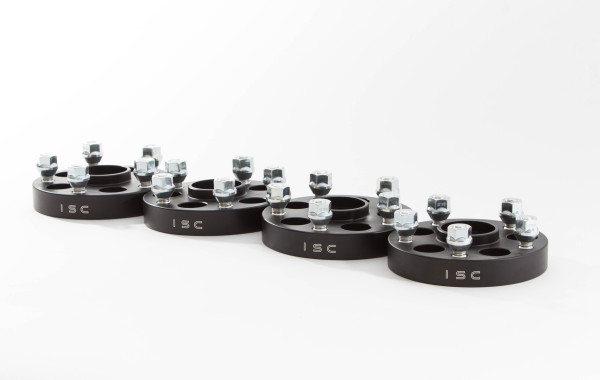Are Wheel Spacers Safe?
MYTHS
Wheel spacers are not safe
No, wheel spacers are perfectly safe if installed properly and on the proper application. The most common cause for failures is not due to the actual wheel spacers but install issues; incorrect hub bore (wheel to spacer or spacer to hub), incorrect torque value on wheel bolts or lug nuts, etc. If the wheel, hub and spacer is correct for the application and the bolts/lug nuts are torqued to the proper specs, there should be no problem with running spacers……even on a race track (that doesn’t mean that your wheels/tires might not rub….that’s a different situation).
Wheel spacers will cause my wheel studs to bend
Not true. The load from the wheels are transferred to the axle and hub by means of friction through clamped force. You cannot bend a wheel stud simply by torquing down a piece of aluminum in between the stud and nut. The only way to do so is if the lug nuts are torqued improperly and the weight of the vehicle is entirely put on the loose wheel bolt/stud(s).
When using wheel spacers the physics of the wheels are disturbed and not correct
When you insert a wheel spacer between the hub and wheel nothing in regards to clamping force, coefficient of friction, stress applied to the studs, flexing, load or any other physics involved are changed.
Wheel Spacers will cause my wheel bearings to failure prematurely
Wheel spacers will not cause your wheel bearings to fail prematurely. Again, as long as the application is correct for your specific vehicle, you should have no problems. Make sure that the hub bore on your vehicle matches the hub bore on the spacer and the new extended hub bore on the wheel spacer matches the hub bore on your wheel.
If I install wheel spacers, my wheels and/or tires are going to rub the fender
Not if you measure before ordering your spacers. This is the MOST COMMON problem when people go to install their spacers. In order to make sure you don’t have this issue, you need to take a straight edge (ruler) and lay it against the outer most part of your wheel or tire (which ever sticks out more). Run that ruler straight up towards your fender so it goes INSIDE your wheel well. Then, take another ruler or tape measure and measure the distance from the ruler to the inner most point of your fender (that might be the fender liner or a plastic fender nut or…..). Once you have the measurement, this is the absolute widest point at which your wheel/tire WILL RUB. Example; if you measure 25mm, you probably shouldn’t buy 25mm spacers. You need room for movement within your suspension. We might recommend a 15mm or 20mm spacer in this instance.
In the end, use the old carpenters moto; measure twice and cut (buy/install) once!
TRUTHS
Wheel spacers are safe
True! When properly installed, wheel spacers are completely safe.
Using longer wheel studs on a wider spacer has no effect on performance or wear
This has been found to be true through testing.
How are ISC Hub Centric Spacers different?
- They provide a perfect fit for your specific vehicle when choosing the right application
- No hub rings are required – all of our spacers are designed for a specific application (no universal fitments here!)
- Backed by ISC’s quality standards/specs – Precision CNC machined billet spacers – 10x high quality studs – CNC 6061 T6 light weight high grade aluminum – unbeatable warranty
Article updated on December 21st, 2018

